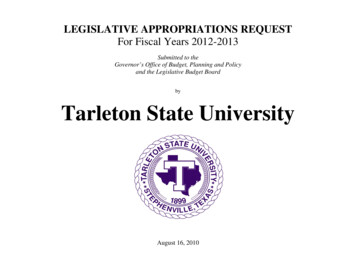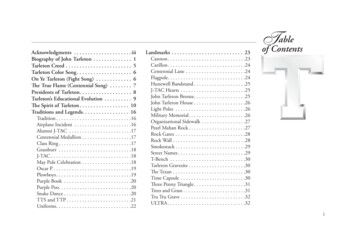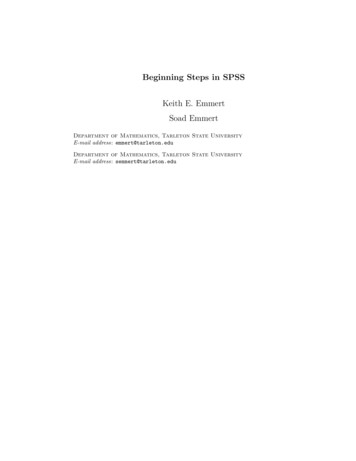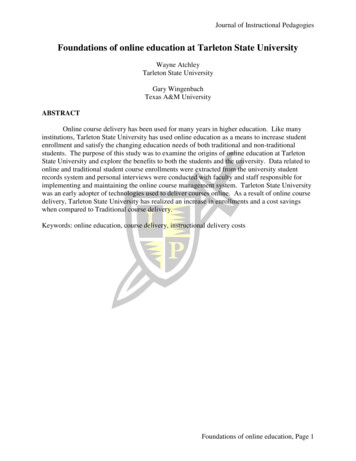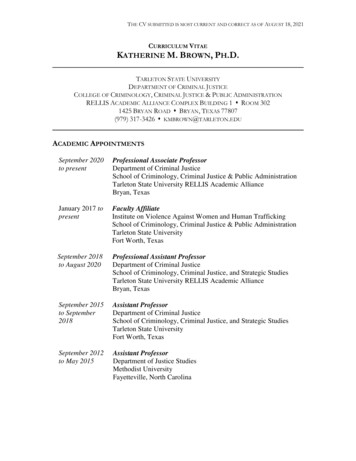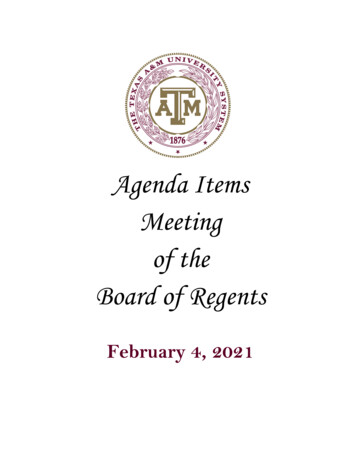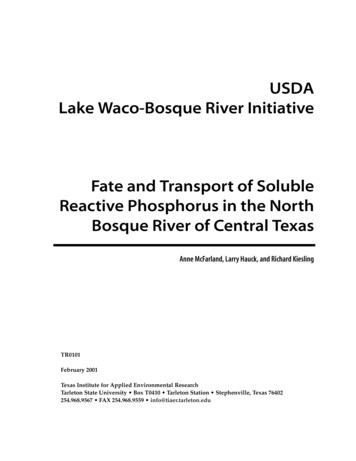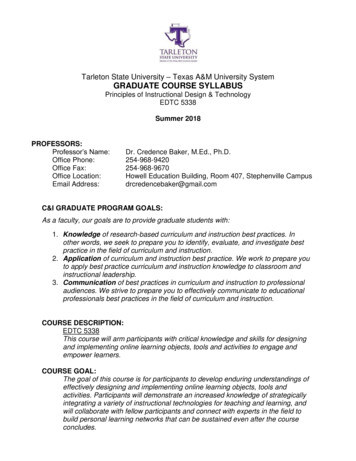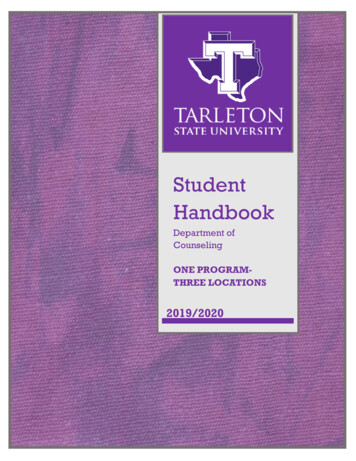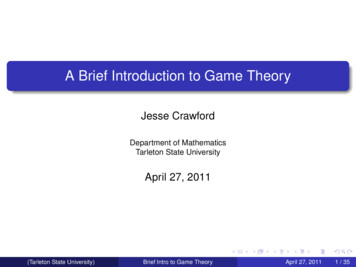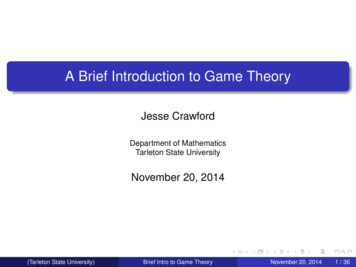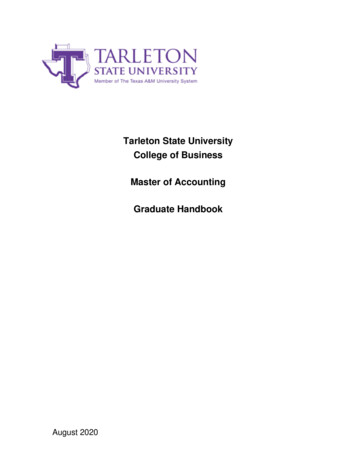
Transcription
Tarleton State UniversityCollege of BusinessMaster of AccountingGraduate HandbookAugust 2020
Welcome to Tarleton State University’sgraduate program in accounting.We are delighted that you have chosenTarleton State to be a part of yourprofessional accounting career and lookforward to serving you.If you have a question about how things work, you may want to start withMs. Jodie Dearing, Graduate Program Manager for our College ofBusiness, at jdearing@tarleton.edu or (254) 968-9055. You may alsocontact me.I wish you a happy, productive, and successful experience as agraduate student.Dr. Derrill WatsonDepartment Head and Associate ProfessorDepartment of Accounting, Finance and EconomicsPO Box T-0920Stephenville, Texas 76402254.968.9342 (Voice)254.968.9665 (Fax)Thank you for joining us to become part of TarletonState’s tradition of outstanding professional accountants.I will be available to you throughout your master’sstudies. I will help you with coursework planning, tailoredto your career ambitions.Dr. Charles Thomas, PhD, CMA, CGMA, CPAProgram Coordinator and ProfessorAugust 2020
INTRODUCTIONAll entering Master of Accounting (MAcc) students will participate in anorientation session organized by the College of Business (COB). Duringthis orientation session, this handbook will be provided to students.Additionally, entering MAcc students should review the College ofGraduate Studies virtual index.html3
COB Mission StatementThe College of Business creates a dynamic learning environment for a diversestudent population with a broad range of backgrounds, perspectives, andexperience, to develop the knowledge and skills needed to become productivecontributors to the global business environment.COB VisionThe College of Business at Tarleton State University will be a regional leader inbusiness education.4
Core ValuesAt Tarleton State University, we are guided by core values: iceThrough transformative learning experiences these values help shape studentsinto productive, creative, ethical, engaged citizens and leaders contributing to theintellectual, cultural, economic and social advancement of the communities theyserve.Academic IntegrityAcademic integrity represents the choice to uphold ethical responsibility for one’slearning within the academic community, regardless of audience or situation.Academic ServiceTarleton faculty, staff, and students are expected to model responsible citizenshipthrough service activities that promote personal and academic growth whileenhancing the university, local, regional, national, and global communities. Theseactivities will foster a culture of academic/public engagement that contributes to theachievement of the university’s mission and core values.Academic CivilityStudents are expected to interact with professors and peers in a respectful mannerthat enhances the learning environment.Academic ExcellenceTarleton holds high expectations for students to assume responsibility for their ownindividual learning. Students are also expected to achieve academic excellence by: Honoring Tarleton's core values.Upholding high standards of habit and behavior.Maintaining excellence through class attendance and punctuality.Preparing for active participation in all learning experiences.Putting forth their best individual effort.Continually improving as independent learners.Engaging in extracurricular opportunities that encourage personal andacademic growth.Reflecting critically upon feedback and applying these lessons to meet futurechallenges.5
PROGRAM OVERVIEWDesigned to prepare students for professional careers in the public,private, or governmental sector. As part of this objective the program isdesigned to provide the educational background to become a CertifiedPublic Accountant or to attain other professional certifications such asCertified Management Accountant, Chartered Global ManagementAccountant, and Certified Fraud Examiner.Educational Objectives of the ProgramTo prepare students as professional accountants in public practice or inbusiness.To develop each student’s intermediate proficiency in all technicalcompetence areas of accounting generalists and to develop advancedproficiency in financial accounting & reporting and at least one otheraccounting technical competence area (taxation, audit & assurance,accounting information systems, managerial accounting).6
Intended Learning Outcomes of the Program Graduates of this program will be competent in and be able to applyaccounting concepts and technology to solve problems. Thislearning outcome includes the development of critical thinking andproblem-solving skills, as well as an understanding of the strategicrole of accounting in business organizations and society. Graduates of this program will be able to communicate clearly, andstrategically, after considering the relevant audience, situation, andpurpose of the communication. Graduates of this program will be able to enhance, as a leader or amember, the leadership and collaborative ability of individuals inorganizations. Graduates of this program will be able to use relevant data sources,including academic and professional literature to gain newknowledge and analyze business situations. Graduates of this program will be able to translate ethical values intopractice. Graduates of this program will be able to demonstrate culturalsensitivity and critical reflection to solve complex problems, at bothan individual and team level. Graduates of this program will be able to demonstrate aninternational perspective and appreciation for diversity and culturaldifferences, along with their significance in global business.Coursework and TimingDesigned to be flexible, our program accommodates students enteringin the Fall, Spring, or Summer. Courses are offered in Stephenville, FortWorth, and Waco, Texas. Several courses are offered in an online format,but many are offered face-to-face. Online class meetings meet the needsof working professionals, while face-to-face class meetings facilitate otherforms of learning and development as well as addressing the requirementsof the Texas State Board of Public Accountancy and visa requirements ofinternational students.7
Program Learning Goals and AssessmentFaculty of the MAcc Program have established learning goals andassess performance in meeting these goals; these learning goals reflectthe program mission, student body, graduate placement expectations, andother related factors. Comprehensive examinations of students are onemeans used in continually assessing performance. Lists of competencieswith associated performance criteria are maintained and used by faculty inevaluating the overall curriculum, individual courses, and activities withincourses. These lists of competencies, also known as rubrics, are intendedserve as a bridge between program learning goals and evidence gatheredto assess achievement.8
AccreditationAccreditation of an institution is the result of an external body reviewingthe process of an organization, the qualifications of personnel, and thestudent assessment processes in place to drive student learning. At theuniversity level, Tarleton State University is accredited by the SouthernAssociation of Colleges and Schools Commission on Colleges(SACSCOC). The College of Business falls under this accreditation alongwith each of the programs under it. Additionally, the College of Business isalso accredited by the discipline specific accrediting body AccreditationCouncil for Business Schools and Programs (ACBSP). Finally, the Collegeof Business also pursuing accreditation by the Association to AdvanceCollegiate Schools of Business (AACSB), an achievement held by fewerthan 5% of the world's business schools.Source: Schaefer, T. F., & Stevens, J. S. (2016).Among other means, MAcc faculty will evaluate students’comprehensive examination results to assess achievement of learninggoals.9
ADMISSION, CANDIDACY REQUIREMENTS, ANDAPPLICATION PROCESSAdmissionAt Tarleton State University each department sets its own admissionrequirements and makes independent admission decisions for graduatestudies.The Department of Accounting, Finance & Economics (the Department)admission criteria for its Master of Accounting (MAcc) program have beendeveloped to conform to State of Texas requirements and are based on thegeneral admission requirements of the Graduate School.All applications for admission to the MAcc program are reviewedindividually. Admission decisions are based on factors associated withacademic success in graduate study and may include any of the followingcriteria: (1) undergraduate grade point average, (2) performance inaccounting classes at Tarleton State, (3) GMAT (or, alternatively, GRE)scores, (4) professional work experience, (5) personal accomplishments,(6) letters of reference, and (7) the applicant's personal statement.Standardized test scores are not used as the sole criterion for admittingapplicants or denying admission to applicants.Admission CriteriaThe Department provides for certain applicants to be unconditionallyadmitted to the MAcc program. Other applicants are referred to theDepartment for consideration. Unconditional admission is granted toapplicants whose documentation clearly demonstrates a readiness forgraduate study.Individuals who meet all of the following three conditions are givenunconditional admission: 1) majoring in accounting at Tarleton State or anAACSB-accredited school and having completed at least 12 semestercredit-hours of upper-level accounting courses with grades of C or better;2) at least a 3.0 GPA overall and in accounting course work; and 3)completed a minimum of 60 semester credit-hours at Tarleton State or anAACSB-accredited school.Applicants requiring Department consideration for admission areconsidered using the following factors, with no single factor used as theprimary criterion for making admission decisions: Undergraduate GPA (overall)10
Performance in accounting coursesGMAT/GRE scores (including separate scores on sections)Work experience and other accomplishmentsLetters of reference andPersonal statement of applicantAfter an applicant's credentials have been evaluated by the MAccProgram Advisor the applicant will be notified by letter and email sent bythe COB Graduate Admissions Office of: 1) acceptance and admissionunder one of the categories of admission listed below; or 2) denial ofapplication. If accepted, the acceptance notification will state conditions foradmission, if any, and period of validity of the acceptance. Applicants whohave not received an admission notification one week prior to the beginningof classes for the semester for which admission is sought should contactthe COB Graduate Programs Manager for information concerning thestatus of their application.Unconditional AdmissionAn applicant who meets all requirements is normally considered forunconditional admission.Probationary AdmissionAn applicant who does not meet all requirements for unconditionaladmission nevertheless may show promise for successful graduate studyand, upon recommendation of the MAcc Program Advisor and Head of theDepartment of Accounting, Finance & Economics (Department Head), withapproval of the Academic Dean, may be granted probationary admission.Special course requirements or other conditions may be imposed by theAdvisor and/or Dean.Denied AdmissionAdmission is typically denied if an individual fails to meet more than oneof the admission standards of the department to which he or she appliedand the MAcc Program Advisor feels that there is insufficient basis to justifya probationary or provisional admission recommendation. As theadmission process is competitive, students meeting basic admissionrequirements who are less well qualified than other applicants may also bedenied admission.Applicants denied admission to a graduate program may not take orreserve graduate courses for graduate credit. Applicants may reapply for11
admission if the deficiencies in credentials that led to denial are remedied.Applicants denied admission may ask the MAcc Program Advisor about thereasons for the denial.Candidacy RequirementsThe MS Accounting program is designed primarily for students whohave undergraduate preparation in accounting. However, exceptionalcandidates from other disciplines may be considered for admission. Mostsuccessful candidates have completed accounting coursework through theintermediate level. The following courses or their equivalents are normallycompleted by all students before beginning graduate study: Intermediate Accounting I Intermediate Accounting IIAdditionally, leveling courses are for students who have not taken therequired business courses to be prepared for the graduate level courses.These are required for background in economics, finance, management,marketing and statistics. Any leveling courses required must be completedwithin the first 12 hours of the degree. Students cannot take anothercourse in a subject area until the leveling has been completed; e.g., youcannot take FINC 5307 until you have completed any required FINCleveling.Students can apply to the program prior to the completion of thiscoursework. However, if admitted, students will be required to completethese courses (and possibly other courses) so they will have the necessarybackground to be prepared for the graduate level courses AND to meet theminimum requirements to sit for the CPA examination. The courses listedabove will not count toward the required hours of the program andadditional coursework will extend the program and delay graduation.Application ProcessThe initial application process is handled through our College ofGraduate Studies. Our Graduate Program Coordinator will send you anemail notifying you when you have been accepted. This notification is alsosent to the COB Graduate Program Manager.The next step is to be admitted to the College of Business (COB). Abouta week after you receive your College of Graduate Studies acceptance,you will receive by email from COB a welcome letter acknowledging youracceptance into the College of Graduate Studies and informing you of your12
requirements for admission into MAcc Program. Depending upon yourexperience and academic background, you may be required to take one ormore courses prior to admission.13
Appeals to Admission DeterminationsDenials of admission are made only after an extensive review ofacademic qualifications and weighing those qualifications against thecompetitive nature of our applicant pool; therefore, these decisions arerarely overturned and are considered only for extraordinary reasonsbeyond the control of the applicant.Appeals must be submitted in writing within 15 days of the date on thedenial notification and must include a basis for the appeal and supportingdocumentation. We will notify you by email within 4 to 6 weeks, of ourresponse to your appeal request. Only one appeal may be submitted; so,the packet must be clear and compelling when submitted.All appeals must be submitted to:Dr. Derrill Watson, Department Head and Associate ProfessorDepartment of Accounting, Finance & EconomicsPO Box T-0920Stephenville, Texas 7640214
PROGRAM COMPONENTSThe Master of Accounting Program is composed of an initial orientation,a set of courses, and a comprehensive examination.Upon entering the Master of Accounting program, each student shouldcomplete the Tarleton State College of Graduate Studies New GraduateStudent Orientation which can be found online athttp://online.tarleton.edu/Home files/graduate orientation/index.htmlCourses and other degree requirements are provided in the followingsection.15
DEGREE REQUIREMENTSBecause all graduates of the Master of Accounting program areexpected to possess an intermediate or higher competence in all technicalcompetence areas of accounting generalists and to develop advancedproficiency in financial accounting & reporting and at least one otheraccounting technical competence area (taxation, audit & assurance,accounting information systems, managerial accounting) seven specificaccounting courses are required.Additionally, a financial statement analysis course and a businessresearch course are required.A total of 30 semester credit hours must be completed.Required Accounting CoursesThe following graduate accounting courses are required: Governmental and Not-for-Profit Accounting (ACCT 5307)Advanced Financial Accounting (ACCT 5304)Accounting Theory (ACCT 5357)Federal Tax Accounting I (ACCT 5305)Federal Income Tax II (ACCT 5306)Business & Professional Ethics for Accountants (ACCT 5323)Auditing and Professional Responsibility (ACCT 5324)Required Finance CourseAnalysis of Financial Statement Information (ACCT or FINC 5335)Required Business Research CourseOne of the following graduate business research courses must becompleted: Evidence-based Decision Making (BUSI 5397)Econometrics & Forecasting (ECON 5311)Elective CourseIn addition to the required accounting courses, one other COB graduatecourse is required. We recommend, but don’t require that this additionalcourse be from a discipline other than accounting. Specifically, though, werecommend that students consider courses that will prepare them for anaccounting certification (e.g., CPA, CMA, CGMA, CFE).16
Repeated CoursesTarleton State will not recognize credit for completing certain courses ifother courses have already been successfully completed. For example,students who have successfully completed ACCT 3305 cannot receivecredit for ACCT 5307 (Governmental and Not-for-Profit Accounting).Following the guidance of the Texas State Board of Public Accountancy,we extend the rule of not crediting for repeated courses to situations wherestudents have successfully completed courses elsewhere that areequivalent to Tarleton State courses.Course SubstitutionsMany students will have already successfully completed one or more ofthe required accounting courses. For each such instance, anothergraduate-level COB course will be chosen by the student as a substitute.Accounting Course MinimumNo fewer than five graduate accounting courses must be completed.Time LimitAll requirements for the MAcc degree must be completed within a periodof six consecutive calendar years from the time the student first enrolls inprogram courses.17
Comprehensive ExamA comprehensive assessment is required for all graduate degrees atTarleton State. In order to earn a Master of Accounting, all students mustpass a comprehensive exam. The exam is administered in accordancewith the following University t/compexams.htmlIf performance on the comprehensive assessment is unsatisfactory,another attempt is allowed at the next regular administration or at an earlierdate. If the comprehensive assessment is not successfully completed afterthree attempts, you will be dropped from the graduate program.MAcc students approaching graduation will complete a comprehensiveexamination of accounting and related areas. This examination is intendedto provide evidence of competence in six areas: Financial accounting and reportingTaxationAuditing and assurance servicesAccounting information systemsPlanning, analysis, and control (managerial accounting)Ethical reasoning and professional accountancy ethicsThe exam contains 45 multiple-choice questions and will beadministered with a proctor.The exam will be graded by a panel of faculty members. A score of 75%or better is required to pass.If the student passes the exam, the Accounting, Finance & EconomicsDepartment will notify the Graduate School. If the student does not passthe exam on the first attempt, with permission of the department head, asecond attempt will be allowed immediately after the results for the first testare compiled. The student will have two weeks to retake the exam.If the student passes the exam on the second attempt, the Accounting,Finance & Economics Department will notify the Graduate School. If thestudent does not pass the exam on the second attempt, at the discretion ofthe department head, a student may be offered a third and final attempt totake the comprehensive exam after completing a plan of study.18
If the department head allows the student a third and final attempt, heor she will be assigned one or more faculty advisors to assist the student indeveloping a study plan. The study plan may require the student tosuccessfully audit one or more courses. (Additional fees will apply.)If the student does not pass the exam on the third attempt, he or she willnot be allowed to attain the Master of Accounting degree from TarletonState University.Transfer HoursA maximum of 12 hours of graduate work completed at anotherregionally-accredited institution, and that might have been counted towarda graduate degree may be transferred into the MAcc program under thefollowing conditions:1. The student must submit a transcript and syllabus to the Accounting,Finance and Economics Department head when making the request. Thecourse(s) must be equivalent to MAcc program courses. The Departmenthead has the final say if the course is acceptable.2. Credit for course work submitted for transfer must be shown insemester credit hours or equated to semester credit hours.3. Student must have earned an A or B in all courses transferred in.Class RegistrationThe following link is for udents/admitted.html It is important to remember that the availability of classes cannot beguaranteed and overrides into closed sections are not always permitted.You need to access DuckTrax for an accurate source of current classofferings. Registration for the spring semester is held the preceding fall semesterand registration for the summer and fall semesters is held the precedingspring semester. The MAcc program follows a specific course rotation. Some classesfill up quickly; so, please register in a timely manner. Remember, you canlocate classes and view current course availability on DuckTrax. Students need to be aware that, on rare occasion, they may need totravel to various sites (Fort Worth, Waco, Stephenville) to take a class inorder to graduate on their timetable.19
A note of caution! If payment is not made on time, the university willdrop a student's registration. It is the student’s responsibility to ensure thatpayment is made on time. The academic calendar on the Tarleton StateUniversity homepage includes payment deadlines for your time statusThe University defines full-time status as being registered for a minimumof nine semester credit hours during a fall and spring semester, and ninesemester credit hours during summer semesters.International students should contact the Office of InternationalPrograms to determine the minimum number of credit hours required, andthe mode of delivery of those classes, depending on the type of visa held.Maximum hoursGraduate students may enroll for a maximum of 16 credit hours during aregular semester and 12 credit hours for summer semesters. Requests toexceed the maximum hours must be made through the Accounting,Finance and Economics Department head.Continuation of EnrollmentStudents who have been granted admission must register in the term forwhich admission is granted. Any student who fails to register during anysemester will be required to apply for reactivation.Time LimitAll requirements for the MAcc degree must be completed within a periodof six (6) consecutive calendar years from the time the student first enrollsin program courses for the degree to be granted.Degree PlanAll students are required to have a degree plan on file with the Collegeof Graduate Studies. A student will not be permitted to make applicationfor graduation without a degree plan. A student will receive a degree planupon full admission to the MAcc Program. The Department of Accounting,Finance and Economics highly recommends a student confirm inDegreeWorks his or her status prior to attempting to register for graduationto assure his or her plan is on file.20
Graduate Student Academic PerformanceEvery student enrolled in the College of Graduate Studies is required tomaintain a high level of performance and comply fully with the policies ofthe institution. The College reserves the right to suspend any graduatestudent who does not maintain satisfactory academic standing or fails toconform to University policies, rules, and regulations. The College alsoreserves the right to impose sanctions beyond those imposed by theUniversity for violation of College or University policies, rules, andregulations (See Student Code of Conduct, Sect. 9.1 DisciplinarySanctions).Students who have achieved admission are expected to maintain aminimum 3.0 GPA on work completed at Tarleton.Note: A student's cumulative GPA is calculated based on courseworkattempted at Tarleton State University and a student's overall GPA iscalculated based on coursework attempted at Tarleton State Universityplus any applicable transfer coursework. Graduate courses taken forleveling or as undesignated electives are used in the calculation of thesemester and cumulative grade point averages and thus determine one'sacademic standing.If, in a particular semester, a student's cumulative GPA or overall GPAfalls below the 3.0 GPA minimum, he/she will be given notice ofunsatisfactory academic performance. To correct this unsatisfactorycondition:The student must attain a 3.0 cumulative GPA during her or his nextperiod of enrollment.If, for a second semester during the student’s program, a student’scumulative GPA or overall GPA falls below the 3.0 GPA minimum, he/shewill be given notice of unsatisfactory academic performance and he/she willbe automatically suspended for one semester (fall, spring, or spring). Tocorrect this unsatisfactory condition:The student must attain a 3.0 cumulative GPA during her or his nextperiod of enrollment.If, for a third semester during the student’s program, his or hercumulative GPA or overall GPA falls below the 3.0 GPA minimum, he/shewill be given notice of unsatisfactory academic performance, will besuspended indefinitely, and will be dropped from the program.21
A graduate student is allowed one suspension. If poor academicperformance results in a second suspension, the student will be droppedfrom the program and may be permanently dismissed from the university.Note: Graduate students who are on suspension must reapply (includingthe application fee) to the College of Graduate Studies for reinstatement.At the end of any grading period, if a student's overall GPA falls below2.0, he/she will be automatically suspended and dropped from the program.Monitoring Student PerformanceMembers of the Department of Accounting, Finance and Economicsfaculty, using their professional judgment, continually evaluate students'performance (academic and professional responsibility). Some of thecriteria used by the faculty to evaluate students include: Department Policies and Procedures;Receiving a grade of C or below;A cumulative GPA below 3.0;Faculty’s observations of performance (academic or professionalresponsibility);Tarleton State University’s Rules; andProfessional Codes of Ethics (including those required of members ofAICPA and IMA).GraduationA student must earn at least a 3.0 GPA on all courses used towardstheir master’s degree.It is the student’s responsibility to make sure all university requirementsregarding final procedures related to degree are followed and completed.Please be aware that the deadline for registering for graduation is early.The following link contains comprehensive graduation ex.html22
IntegrityIntegrity is a state or condition of being whole, complete, unbroken,unimpaired, sound, perfect condition (Erhard, Jensen, & Zaffron, 2016).This wholeness rests upon an alignment of intention and purpose, that is, acommitment to sound moral principles (Monga, 2016). Empirical evidencedemonstrates that integrity is positively correlated with organizationalperformance (see, for example, Guiso, Sapienza, & Zingales (2015) andDikolli, Keusch, Mayew, & Steffen (2019)). Integrity for the MAcc Programincludes providing assurance to the program’s stakeholders that graduatespossess the characteristics required to be successful accountants.One of the most valuable assets a professional accountant possesses ishis or her reputation for integrity. Unlike many other assets the accountantmay acquire throughout one’s career, once one’s integrity has beenimpaired, it is very difficult to rebuild its original value. The MAcc programis designed to prepare students for a successful career in accounting, andtherefore it is imperative that only the highest standards of integrity arepracticed – even as a student.Therefore, if a graduate accounting student has been referred to theoffice of the Dean of Students, and has been found to have beenresponsible for an infraction regarding integrity (e.g. academic dishonestyas defined in the Academic Conduct Policy from Student Rules), then thedepartment head must convene a council of three graduate facultymembers to consider whether the infraction (or infractions if there is apattern of infractions) is sufficient to expel the student from the MAccprogram. Those three graduate faculty members cannot include theprofessor who referred the student to the office of the Dean of Students forthe infraction which prompted this council.The decision of the council can range from doing nothing more thanwhat the office of the Dean of Students has imposed to expulsion from theMAcc program. The decision could also consider suspending the studentfor any time period determined by the council.23
Appeals Process:The student h
The Department of Accounting, Finance & Economics (the Department) admission criteria for its Master of Accounting (MAcc) program have been developed to conform to State of Texas requirements and are based on the general admission requirements of the Graduate School. All applications for admission to the MAcc program are reviewed individually.
